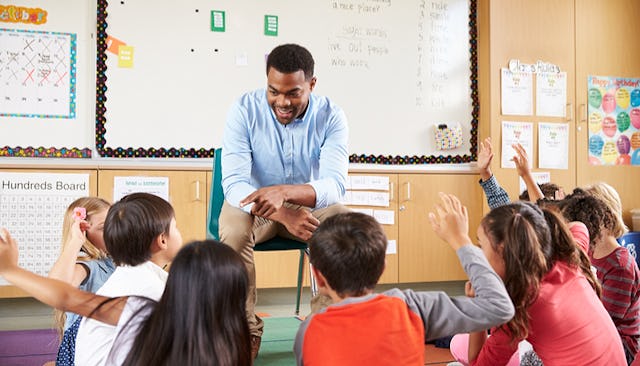Hey Teachers, Thanks For Loving Our Kids

Not long ago, I sat in a parent-teacher conference trying (and failing) to hold back tears. I was frustrated with myself for being so emotional, but I couldn’t help it. My son’s academic performance was suffering big-time, his learning difficulties overshadowing his potential, and I worried that he would develop the unfair reputation of being “that kid” — the one with the troubles at school, not the sweet, smart, innovative boy I know at home.
But his teacher looked me directly in the eyes and said simply, “I see him.” And those three little words were weighted with everything I needed to hear. She didn’t judge him as a person based on his grades or his inability to pay attention. Despite his quirks, despite his flaws, she saw him.
My son is one of many students in his class, of course, and I know he isn’t the only one with special needs. The fact that she took the time to see past his surface spoke volumes, and it made me realize a very profound truth: Teachers everywhere are so, so sorely underrated.
Think about how much weight they carry on their shoulders, these people we entrust with our children for eight hours a day. Each year, every new class proves to be a grab bag of individual issues; these two have ADHD, this one is deaf, that one is painfully shy, another just lost her father, and one boy’s only meal of the day is the lunch he eats at school. That’s just a small fraction of the overall classroom population, each bringing something unique to the mix.
A teacher must be aware of each child’s issues, and if the parents don’t mention those challenges, figure those issues out entirely on their own while remaining ever-mindful of how they can best work around them to make sure the child benefits from his or her school day. They become invested. They lose sleep worrying about how to help “their” kids.
The current social and political landscape doesn’t exactly simplify a teacher’s job. Escalating hate crimes, issues unique to minority populations, and an unprecedented risk of violence on school grounds are things that today’s teachers are expected to be prepared for. They’re required to know exactly how to handle not only the standard emergency situations, such as tornadoes and fires and earthquakes, but also the relatively recent and very real threat of active shooters.
Teachers effectively soothe the everyday worries and frustrations of their students, which range from an inability to tie shoes to homelessness. They must gracefully answer the tough questions that arise from inequality. They must be understanding and tolerant of the hardships that can come along with being a student who is LGBTQ, or in a minority group, or or has a learning difficulty or disability and model that tolerance for other students.
In the midst of all that, teachers still must perform the near-miraculous task of getting such a varied class of students to listen, to learn, to engage, to remember. They have to find new and creative ways to convey even the most boring of facts, to make things “stick” even when it feels like they’re trying to nail spaghetti to a wall.
Day in and day out, they do all of this, for a salary that sometimes barely makes ends meet, especially once they factor in the money they spend from their own pockets to enrich their classrooms for our children. State education budgets don’t cover stickers and hand sanitizer and extra pens, and with additional budget cuts looming, they’re forced to figure out how to make the most of less and less.
Teachers facilitate the gradual sculpting of young minds and hearts into the leaders, the thinkers, the movers and shakers who will shape our nation’s future. They model acceptance and compassion and provide security — both physical and emotional. Their influence goes much deeper than a cerebral level, their daily list of tasks infinitely more complex than they ever get credit for. Teachers are not merely the purveyors of knowledge, the keepers of the chalk; they’re protectors, counselors, mediators, motivators, dispensers of justice, sources of stability.
They may not be their students’ parents, but I can’t think of another profession that more closely mirrors the complex, multifaceted relationships we have with our kids. Because it’s not just professional, it’s personal.
“A good teacher is like a candle — it consumes itself to light the way for others.” –Mustafa Kemal Atatürk
This article was originally published on